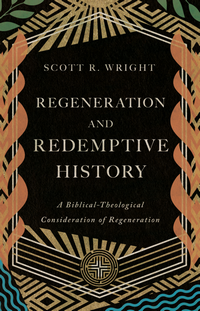 Regeneration and Redemptive History:
Regeneration and Redemptive History:
A Biblical-Theological Consideration of Regeneration
DETAILS: Publisher: Reformed Forum Publication Date: September, 2023 Format: Paperback Length: 214 pg. Read Date: November 19-December 2, 2023

What’s Regeneration and Redemptive History About?
Not too surprisingly, this book shares the outlook outlined in the booklet I talked about a few weeks ago, Unfolding Redemption: Exploring the History and Order of Salvation, and can be seen as an example of the kind of thinking and theological investigation set forth there. In this particular case, Wright looks at the doctrine of regeneration from both the historia salutis and the ordo salutis perspectives.
He begins with a historical survey of the development of the doctrine from the Reformation to the present and then surveys a particular Redemptive Historical outlook on the doctrine. Continuing the surveys, he then considers the Biblical witness to regeneration in the Pentateuch, the Wisdom literature, the Prophets, the Gospels, and then the Epistles. From those surveys, he offers some conclusions, titled “The Eschatological Character,” before moving on to apply this to some practical areas–theology, preaching/teaching, worship, and so on.
What’s the Point?
Why should anyone care about this?
The historia salutis perspective I mentioned before focuses on the objective work done by the Lord Jesus Christ to redeem his people, the eschatological significance of regeneration, and so on. The ordo salutis perspective focuses on the work of the Spirit to apply Christ’s work to the individual believer and what changes come from that.
There’s a shift in the way that Reformed teachers and writers talked about Regeneration around the time of the Synod of Dordt–largely necessitated by the response to the Remonstrants at the Synod, and it came to characterize Reformed soteriology. This shift prioritized the ordo salutis consideration over the historia salutis (in some cases eliminated the latter). This shift would be well and good if the first generations of Reformers had their emphasis wrong, and (particularly) if the Scriptures shared the priority.
Wright talks about it in terms of scope–from a broad view of the changes wrought in regeneration to a narrow, individualistic perspective. That’s probably the best way to summarize things.
Wright’s Historical Survey establishes that shift (although most people who’ve read a decent amount of pre- and post-Dordt will have noticed) and then his Biblical Surveys will either demonstrate that the Scriptures don’t prioritize the ordo over the historia on this point or will at least call into question that idea.
Wright is careful–and (in my view) correct–to not discount what the Reformed church has taught on the ordo salutis aspects of Regeneration. But his concern is that we’ve lost sight of the richness of our inheritance from Scripture and the Reformers. If nothing else, we shouldn’t let detractors focus our energies the way they have. This is why we should care–if he’s (at least largely) correct, we need to work on adjusting our understanding of the scope of Regeneration.
Wright is not alone in this, he draws from and builds on the work of Vos, Ridderbos, Gaffin, and others as they’ve tried to re-emphasize historia salutis in general, and his debt to them is evident.
So, what did I think about Regeneration and Redemptive History?
I think it’s tricky to convey what I think about this book. Maybe I’m wrong, but it feels slippery in my mind. Let’s see what comes out when I try, shall we?
Let’s start with some positives: I am so glad to see a book-length treatment of the idea–and it answered some questions I had on the topic (nothing pressing, and it turns out I was on the right track with my assumptions–or at least Wright’s track). It will be a fantastic resource for myself and many others–if nothing else, it’ll be a good reference/review, particularly in regard to the surveys. The historical material, the conclusion, and the “Theological Implications” chapter had some really good material that I know I’ll draw upon.
The downsides, on the other hand, are hard to ignore–every chapter should’ve been 30-50% longer. He really needed to develop some of his ideas a bit more thoroughly. “Needed” may have been too strong there, but I think it’s appropriate. I think his writing is clear enough that the reader can take the next few steps on their own, feeling confident that they’re headed in the same direction–but it’d have been helpful if he’d provided a little more for us. This isn’t (just) my typical greed for more of what I like, I think it’d serve the material better.
But the big downside for the purposes of this blog–because I want to talk about the book as an experience–this book is too dry, and the prose is a little clunky. Yes, this a revised version of Wright’s dissertation, and that’s probably the root of it. I’ve read other dissertations turned into books and have run into this before (I’ve also, thankfully, run into authors who’ve spent more time revising their books to make them pleasant reading experiences). Does this make or break the book for me? No–because the meat is there and it’s good and valuable. It just means that there’s a lot of gristle to this steak.
Do I recommend this book? Heartily. Just go into it with open eyes, knowing you’ll benefit from it, but you won’t particularly enjoy the read.

![]()


